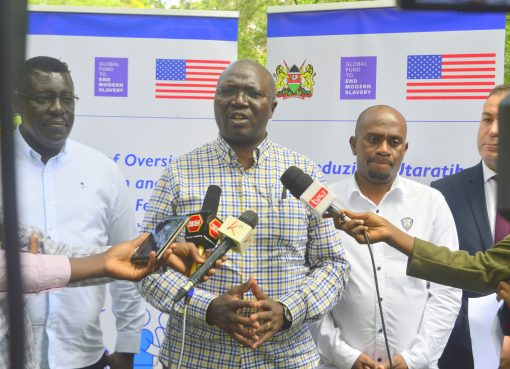The seven member States of the Inter-Governmental Authority on Development (IGAD) have today endorsed the Blue Economy Strategy 2021-2025 aimed at spurring economic growth and better livelihood in the entire region.
The sister States reaffirmed among other efforts to domesticate and implement the authority’s regional Blue Economy development strategy taking into account peculiarities and interest of each country.
A communique signed by Ministers from Kenya, Djibouti, South Sudan, Sudan, Somalia, Ethiopia and Uganda on Friday this week also directed the sitting IGAD Secretariat to fully implement the Authority’s Blue Economy Strategy and assist member States domesticate the regional Blue Economy Strategy.
The IGAD Blue Economy strategy and implementation plan intends to structure the Blue Economy implementation at both national and regional levels while recognising cooperation and regional integration and strengthening support to the member States to effectively translate policies into concrete actions.
IGAD developed a 5-year strategy (2021-2025) and implementation plan (BESP) aligned with the financial support of the European Union.
In a speech read on behalf of the Cabinet Secretary for Agriculture, Livestock, Fisheries and Cooperatives, Mr Peter Munya, by Fisheries Principal Secretary Dr Francis Owino, Kenya reaffirmed her efforts to promote the Blue Economy Growth at all cost.
Kenya recognises the value of oceans, lakes and other water bodies in the national economic social development context which is only achieved if the role of each contributing sector is properly valued and recognised, said Dr Owino
Ethiopia Minister of Transport and logistics Mrs Dagnawitmages Bekele, said the Ethiopian government has revamped the transport and maritime services policies to improve on livelihoods.
She said IGAD and other partners in the Blue Economy management had provided a good vehicle to spur economic progress in the whole region.
While adopting the final paper drafted and validated by a team of high-level technical experts sitting in Addis Ababa between March 30 and April 1, 2022, the Ministers expressed gratitude to the government and the people of the Federal Democratic Republic of Ethiopia for hosting the Ministerial meeting.
They further called upon and mandated the Republic of Sudan as the current chair of IGAD to bring the resolution to the attention of the next council of Ministers and to the IGAD summit.
The African Union has identified Blue Economy development as a priority goal towards achieving the aspiration of a prosperous Africa based on inclusive growth and sustainable development within the context of the Africa Union Agenda 2063.
Africa’s Blue Economy could be a major contributor to continental transformation, sustainable economic progress and social development.
Consequently, key element among other resolutions passed by the Ministers in Addis this week included a strong pledge of a commitment to provide the necessary support to promote Blue Economy, infuse governance and appropriate institutional frameworks and a commitment to encourage public private partnerships to participate in implementing the IGAD Blue Economy Strategy.
More importantly, the communique calls for enhancement of synergies among Blue Economy institutions including, implementation and reporting on multilateral environmental agreements and conventions to which all member States are party to.
Others are emphasis on enhancing synergies and collaboration with other regional and international entities and organisations involved in the field of Blue Economy, and commitment to integrate a gender responsive approach to policies and interventions on Blue Economy.
The communique also calls upon the international community, development partners, non-state actors and other interested parties to assist IGAD member States to manage and maintain the sustainability of the Blue Economy as well as the livelihoods of the communities in the region.
In the same spirit, the ministers also agreed to adopt a whole government approach in implementing the IGAD Blue Economy Strategy.
The IGAD Secretariat, as per the directive of the Ministers of the members States, would also be compelled to support member countries in the development of the National Blue Economy Strategies, and strengthen the Blue Economy section within it.
Furthermore, the Secretariat would be responsible for resource mobilisation to support the development and sustainable management of the Blue Economy sections within the region.
The crafting and adoption of the important communique comes in the wake of realization by the countries about the mandate IGAD has within agriculture and environment, including achieving sustainable economic development, poverty alleviation, management of natural resources and effective environmental protection.
The strategy paper also spells a unifying framework on the Blue Economy on areas of cooperation stipulated in the agreement establishing IGAD and States’ committal to cooperate within the Blue Economy sectors that include among others environmental protection and management of national resources of the region.
The Ministers acknowledged the intrinsic values of the Blue Economy and its vital role in the function of the aquatic ecosystems and the sustenance of all forms of biodiversity and livelihood to adopt this important paper.
The importance of protecting and establishing the Blue Economy for socio-economic and ecosystem services also played a major role in coming up with working guidelines to spur growth of the Blue Economy within the sister States.
Seriously emerging challenges notwithstanding, the Ministers recognised the Blue Economy space, ecosystems and the unique forms of lives within their respective countries that must be safeguarded.
Besides that, the concerns that the environment pollution and degradation that posed a great threat to sustainable development and could lead to vulnerability of the livelihoods of communities in the region triggered the urge to prepare and endorse the paper.
The Ministers acknowledged the fact that a sustainable Blue Economy needs to involve the active representation and participation of both women and men.
At the same time, the countries had remained mindful of their commitment to domesticate and coordinate the implementation of IGAD Regional policies and strategies that include the IGAD cooperate policy, environment policy, the IGAD biodiversity policy and protocol, the IGAD wildlife management strategy, the IGAD Water policy, the IGAD regional tourism master plan and the IGAD forest policy.
Others included the African Union and the United Nations multilateral environment agreements to which the States are partners.
Above all, the birth of the communique was prompted by the fact that the sister States wanted to enhance the alignment of their national Blue Economy Strategies with the African Union Blue Economy Strategy, the African Union Agenda of 2063 and its 10-year implementation plan as well as the United Nations sustainable development goals.
“Noting the increasing impact of the climate change on the livelihood and resilience of the communities and the environment, and cognisant of the impact of the forced displacement of the region’s natural resources, it is important that a working strategy be put in place to address all these nagging problems hindering the smooth growth of Blue Economy within this region,” remarked Gibril Ibrahim, the chairman of IGAD who presided over the official signing and adoption of the communique by the Ministers.
By George Agimba





